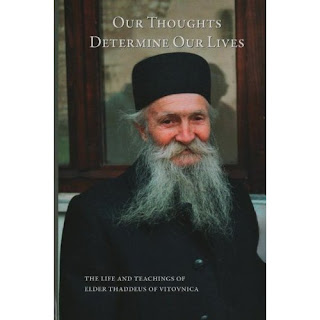> Our women’s group at St. John Orthodox Church has been studying a book on the spiritual life by a twentieth century Serbian Elder, Thaddeus of Vitovnica: Our Thoughts Determine Our Lives: The Life and Teachings of Elder Thaddeus of Vitovnica
Our women’s group at St. John Orthodox Church has been studying a book on the spiritual life by a twentieth century Serbian Elder, Thaddeus of Vitovnica: Our Thoughts Determine Our Lives: The Life and Teachings of Elder Thaddeus of Vitovnica
From the book cover:
 Elder Thaddeus of Vitovnica was one of the most renowned spiritual guides of Serbia in the twentieth century. As a novice he lived in obedience to Elder Ambrose of Miljkovo Monastery, a disciple of the Optina Elders. From him Fr. Thaddeus learned the Prayer of the Heart and the selfless love that came to characterize his whole ministry to the suffering Serbian people. Born in 1914, Elder Thaddeus lived through all the suffering endured by Serbia in the twentieth century. Over the course of two World Wars, during the Communist takeover, and through the NATO bombings of 1999, he co-suffered with his people. He taught, counseled, and prayed for all who came to him in pain and sorrow. His words of love and hope provided spiritual balm for people from all classes of society. In 2002 Elder Thaddeus reposed, leaving behind a large collection of his teachings, preserved by his faithful spiritual children. His life, teachings, and spiritual conversations are here presented for the first time in English.
Elder Thaddeus of Vitovnica was one of the most renowned spiritual guides of Serbia in the twentieth century. As a novice he lived in obedience to Elder Ambrose of Miljkovo Monastery, a disciple of the Optina Elders. From him Fr. Thaddeus learned the Prayer of the Heart and the selfless love that came to characterize his whole ministry to the suffering Serbian people. Born in 1914, Elder Thaddeus lived through all the suffering endured by Serbia in the twentieth century. Over the course of two World Wars, during the Communist takeover, and through the NATO bombings of 1999, he co-suffered with his people. He taught, counseled, and prayed for all who came to him in pain and sorrow. His words of love and hope provided spiritual balm for people from all classes of society. In 2002 Elder Thaddeus reposed, leaving behind a large collection of his teachings, preserved by his faithful spiritual children. His life, teachings, and spiritual conversations are here presented for the first time in English.
 The premise of the book comes from Elder Thaddeus’ teaching on thoughts:
The premise of the book comes from Elder Thaddeus’ teaching on thoughts:
Our life depends on the kind of thoughts we nurture. If our thoughts are peaceful, calm, meek, and kind, then that is what our life is like. If our attention is turned to the circumstances in which we live, we are drawn into a whirlpool of thoughts and can have neither peace nor tranquility.
Recently we were reading from Chapter 10—“On Spiritual Struggle,” which includes a section about how obedience and humility bring freedom and peace:
Our life on this earth is such that we are always becoming enslaved to material things, while the angels never are. This life was given to us so that we may learn about eternal life, that we may learn how to become free, to walk freely and with a clear conscience and pure thoughts.
It’s an interesting paradox, this finding of freedom through obedience to God and through detachment from material things. I can testify that during a time in my life—about fifteen years ago—when I was more focused on spiritual things and less involved with “secular living,” I was, possibly, more at peace. But I was living a fairly insular life, and so I’m not sure how real the peace was. And I still had the same struggles I have today with addictions and depression, so I don’t know that I was any more “free” than I am now. And so I read more of what Elder Thaddeus says:
 There are times when people become depressed and despondent, which is a type of pride in its own way. If a person loves the things of this world, this will invariably lead to despondency, for he will not find God in them. Each human being feels lonely at times, even when he is among people, until the moment he becomes free from the things of this world. At that point, God comes to comfort him.
There are times when people become depressed and despondent, which is a type of pride in its own way. If a person loves the things of this world, this will invariably lead to despondency, for he will not find God in them. Each human being feels lonely at times, even when he is among people, until the moment he becomes free from the things of this world. At that point, God comes to comfort him.
The soul feels lonesome because the power of Grace diminishes in it due to its interest in the things of this world. One cannot go both ways! Unless it is humbled, the soul cannot receive the fullness of God’s Grace, for if it received Grace in its proud state it would surely result in great evil, as was the case with the fallen angels.
 I have a hard time with this passage, because the Elder seems to be saying that God only comes to comfort a person “the moment he becomes free from the things of this world.” But what if a person is so depressed that he can’t free himself? Won’t God come to him in his depression? And how is that depression a type of pride? I’ve read in some of the Church fathers that it’s a form of pride because it (depression) comes from focusing on ourselves, rather than on God and others. But is it really so simple? And I’m not sure how to clearly delineate between “depression” and “despondency” or “acedia”—and which are emotional or chemical imbalances and which are more spiritual in nature, and therefore more a reflection of our spiritual state. I did a series of posts about a year ago on Kathleen Norris’ book, Acedia & Me, that address these issues.
I have a hard time with this passage, because the Elder seems to be saying that God only comes to comfort a person “the moment he becomes free from the things of this world.” But what if a person is so depressed that he can’t free himself? Won’t God come to him in his depression? And how is that depression a type of pride? I’ve read in some of the Church fathers that it’s a form of pride because it (depression) comes from focusing on ourselves, rather than on God and others. But is it really so simple? And I’m not sure how to clearly delineate between “depression” and “despondency” or “acedia”—and which are emotional or chemical imbalances and which are more spiritual in nature, and therefore more a reflection of our spiritual state. I did a series of posts about a year ago on Kathleen Norris’ book, Acedia & Me, that address these issues.
Elder Thaddeus also says:
Chaotic thoughts are the state of fallen spirits (demons, spirits who have fallen away form God). Our mind, however, must remain concentrated, whole, and vigilant. God can only enter a mind that is whole….
Again, I wonder, how few minds God will enter if this is true, because so many of us are not “whole”—we are broken. Our lives are messy. And yes, chaos often rules. I think that might even be more true in the case of artists and writers, as Somerset Maugham says:
“I have an idea that the only thing which makes it possible to regard this world we live in without disgust is the beauty which now and then men create out of the chaos. The pictures they paint, the music they compose, the books they write, and the lives they lead. Of all these, the richest in beauty is the beautiful life. That is the perfect work of art.”
 With Great Lent just around the corner (it begins on March 7 for the Orthodox Church) I have a measure of anxiety about how my struggle will proceed this year. But I’m not going to begin the journey alone. This afternoon I’m traveling to Birmingham, Alabama, with two dear friends to attend a retreat at Holy Trinity Greek Orthodox Church. The speaker will be Father Thomas Hopko and the topic is “Vices & Virtues.” It’s interesting that in the list of vices included in the retreat material, “akedia” (listlessness or lethargy or a sense of futility) is a separate vice from “lype” (sadness or dejection or gloominess or ungodly grief), and “hyperephania” (pride) is another vice altogether.
With Great Lent just around the corner (it begins on March 7 for the Orthodox Church) I have a measure of anxiety about how my struggle will proceed this year. But I’m not going to begin the journey alone. This afternoon I’m traveling to Birmingham, Alabama, with two dear friends to attend a retreat at Holy Trinity Greek Orthodox Church. The speaker will be Father Thomas Hopko and the topic is “Vices & Virtues.” It’s interesting that in the list of vices included in the retreat material, “akedia” (listlessness or lethargy or a sense of futility) is a separate vice from “lype” (sadness or dejection or gloominess or ungodly grief), and “hyperephania” (pride) is another vice altogether.
I’ll be interested to see how Father Hopko explains all of this. I’m also looking forward to one of the break-out sessions on Saturday: “Addiction and Healing.” Check back on Monday and maybe I’ll have a blog post up about the retreat. And please leave a comment with your thoughts on any of these topics.
4 thoughts on “>Spiritual Struggles: A Whirlpool of Thoughts”
Comments are closed.